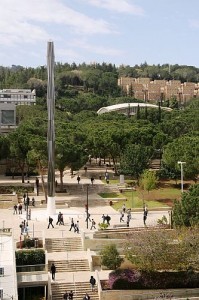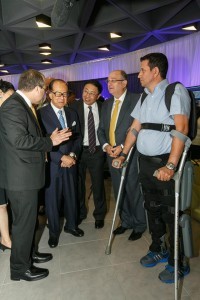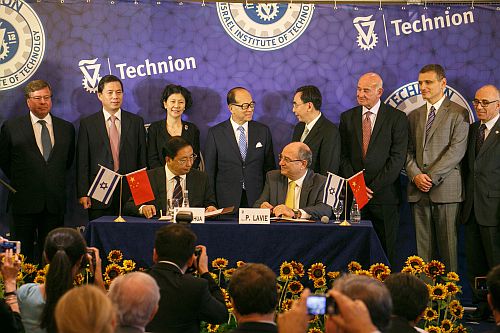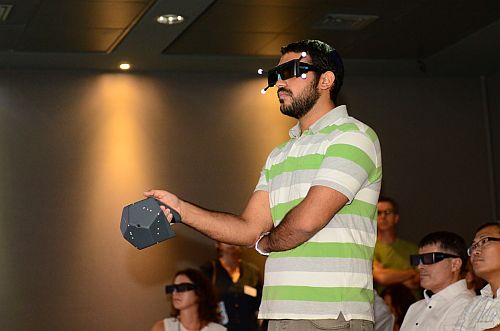“Call it an exoskeleton or a bionic suit, but for paraplegics, it’s freedom. This innovative device, developed by a quadriplegic Israeli scientist, relies on sensors that anticipate shifts in the user’s balance and translates them into movements like walking and standing. Already available in Europe, the suit had its prime-time debut on an episode of Glee and is being reviewed by the FDA for use in the U.S.”
TIME Magazine has named the ReWalk as standing tall among the world’s top 25 inventions for 2013.
Developed by Argo Medical Technologies, the ReWalk is a commercial bionic walking assistance system that uses powered leg attachments to enable paraplegics to stand upright, walk, and climb stairs. The system is powered by a backpack battery, and is controlled by a simple wrist-mounted remote which detects and enhances the user’s movements. The device underwent clinical trials at MossRehab in suburban Philadelphia.
Technion brainchild
Technion alumnus Dr Amit Goffer is that “guy in Israel.” Goffer, a quadriplegic, explains, “In 1997 when I was injured and became confined to a wheelchair, I looked around and wondered, ‘How come the wheelchair is the only solution?’ I was just astonished by that. After studying the problems involved, I started to design the device at home.”
 When Radi Kaiuf, a paraplegic for 21 years as a result of a war injury sustained during Israeli army service, met Goffer at a rehab center and heard about the device, he thought, “I would go to the ends of the earth for something that could help me stand up again.”
When Radi Kaiuf, a paraplegic for 21 years as a result of a war injury sustained during Israeli army service, met Goffer at a rehab center and heard about the device, he thought, “I would go to the ends of the earth for something that could help me stand up again.”
ReWalk enables a person who is paralyzed from the waist down and confined to a wheelchair, to stand up and walk. Kaiuf was skeptical at first. Would he really be able to stand up, look people in the eye, and walk? “A person in my condition can’t imagine that he will ever walk again. The first time I stood up and walked it was phenomenal.”
The user commands the system and controls when he wants to take a step, to stop, to stand, walk about at his own pace, climb stairs and drive. Goffer explains, “It shifts a person from wheelchair-user status to crutch-user status, which is the whole difference. It helps a paraplegic to regain his self-esteem and be included back into society.”
ReWalk has definite health benefits and will reduce healthcare costs. Kaiuf explains, “For our health we are supposed to stand for two hours a day. ReWalk has helped me in a number of ways: my internal organs are functioning better and I haven’t had any pressure sores.”
Goffer earned his Technion BSc in Electrical Engineering, then served in the army, completed his master’s and PhD degrees and worked as an engineer before founding Odin Medical Technologies in 1994 (Medtronic Navigation Israel), a company that makes intraoperative MRI systems.
Together with Goffer, Argo’s team includes other Technion grads in leading positions. Company Operations Manager, Itai Levinson, an Industrial Engineering and Management alumnus proudly explains, “We are developing and manufacturing the first commercially viable upright walking assistance tool. ReWalk is a combination of innovation on a multidisciplinary level, incorporating cutting-edge technology from mechanical and control engineering, electronics and computer science.”
Argo plans further development on ReWalk so that a quadriplegic, like Goffer, will also be able to use it. Goffer smiles and adds, “Developing medical devices requires education and experience; everything was based on the basic education that I received at the Technion – which is priceless.”
The arising of hope
The original ReWalk is available in two versions – the ReWalk I and the ReWalk P. The ReWalk I is intended for use by medical institutions for research or therapy, and is used under the supervision of a healthcare professional, such as a physical therapist. The ReWalk P is a personal unit, intended for personal use by patients at home or in public. The ReWalk system is priced at approximately US$85,000 per unit. An updated version of the system, dubbed ReWalk Rehabilitation 2.0, was unveiled in January 2013. The ReWalk 2.0 features improved sizing, allowing taller individuals to wear it more comfortably, and enhanced controlling software.
A World 1st – Exoskeleton marathon winners.
On 8 May 2012, paralyzed British woman Claire Lomas used a ReWalk to become the first person ever to finish a marathon using a bionic assistance suit. Lomas, who was paralyzed from the waist down in a 2007 riding accident, completed the London Marathon in 17 days with her ReWalk system. Later in 2012, Lomas became the first person to take the ReWalk suit home to assist her in everyday tasks.
The “Glee” of mobility
Over 13 million North Americans watched the Christmas episode of the popular Fox TV series Glee, when paraplegic student Artie stands up and walks with the help of an exoskeleton device he is wearing. Artie explains, “It’s called the ReWalk™, some guy in Israel invented it!”







